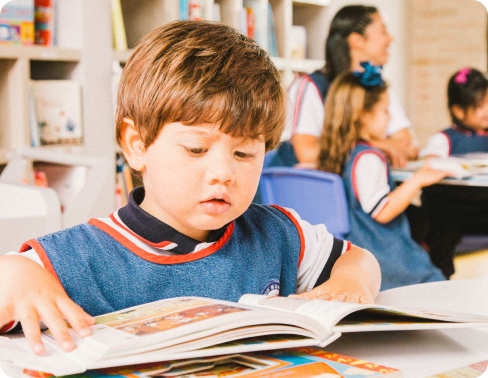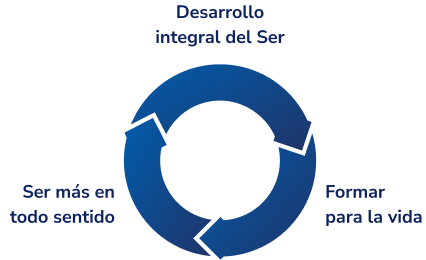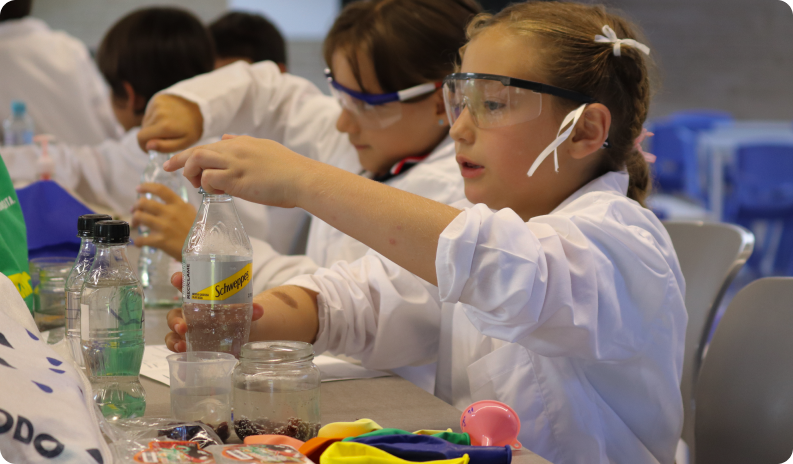The Montessori Pedagogical Model
Knowledge should not be introduced into children's minds. On the contrary, with the existing information, children should perceive the knowledge because of their own reasoning.
-María Montessori
.png)
Through its Pedagogical Model, the School articulates the processes of teaching, learning, and evaluating with "the formation of being for life", promoting a permanent significant relationship between the meaning of education, pedagogy, and academics with the life itself that is lived within it.
Basic premises of the formation at the Colegio Montessori
There are several premises that guide the educational action of the school, but all of them are chained in the conception of education as a process of humanization whose goal is "to be more in every sense".
In this perspective, the great responsibility is to "train for life, to assume that what a boy or girl will be in the future depends firstly on the affection and devotion of their parents, secondly on the intervention of their teachers, for which, each moment of the student's development is recognized and from this, different interventions are made with the purpose of promoting and accompanying their integral formation.
In this formative task, the axes that underlie the Model and that give an answer to the question of how education at Colegio Montessori is? are based on a group of learning processes.


-1.png)
Educational approach
From the different conceptual sources that support the Model, a group of points in common that contribute to and support institutional educational action is focused:
- The development of the intrapersonal dimension.
- Preparation for individual and teamwork.
- The creation of pleasant pedagogical environments, with permanent order.
- Education in inner discipline.
- Learning centered on the connection between skills: cognitive, affective, psychomotor.
- Respect for and encouragement of learning rhythms.
- The valuation of the moment and quality of interactions among students.
- The development of structured classes that include as components: motivation, the dynamization of mental structures, the appropriation of learning from the affective-cognitive-expressive elements.
- Progress in the internalization processes, the basis of autonomy.
- Education during Interaction as a principle and scenario.
- Intentional work with the affective competencies of students.
- The balance between the relationship: academic developments inner life.
- The maintenance of a requirement based on clear principles.
Model Core Strategies
At Colegio Montessori, the training of students is centered on the integral development of the human being from the use of active methodologies, from which are recognized as strategies.
The development of teaching and learning as dynamic processes, in which the quality of the interactions that are established amid an environment prepared and willing to learn, where affection and dialogue are essential components, have a great privilege.
Development of a purposeful "Teaching", which implies an efficient organization from the curricular and pedagogical point of view, clarity of purpose, structured lessons and a practice adapted to the needs of the learners.
The interaction and mediating action from the relationship between parents and teachers to generate home-school collaboration through an orderly and fruitful participation of parents in their children's learning.
The promotion of work in the empowerment and dynamization of thinking skills, reading, writing, new technologies and the experience of values, as the basis for the construction of knowledge, cognitive development and strengthening of autonomy.
The promotion of participation and personal work, based on the value of individual work and the commitment it has on the quality of teamwork.
The integration of evaluation in the pedagogical process as an intentional, contextualized, and systematic component that allows maintaining a formative follow-up to encourage personal development, respecting and promoting individual performance rhythms based on the continuous analysis of processes and results.
The application of positive reinforcement through a clear and fair discipline supported by defined feedback processes, in which high expectations are privileged, that is, confidence in the possibilities of students and teachers.
Admissions
Our school has been providing quality education for more than 47 years and living day by day the values that characterize us as a Montessori community. If you want your child to be part of our school, find here the process to start.
Admissions
